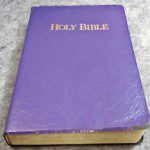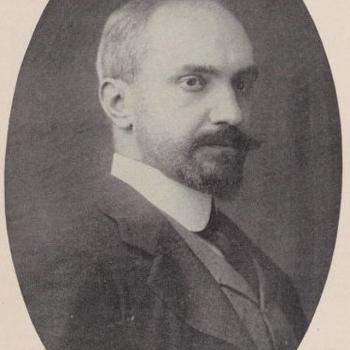 There is a debate going on in a Presbyterian Church near me about the future direction of the church. The senior pastor there, who I will refer to as Dan, has decided to try and steer the church onto a new path, at least partly based on the answer to this question:
There is a debate going on in a Presbyterian Church near me about the future direction of the church. The senior pastor there, who I will refer to as Dan, has decided to try and steer the church onto a new path, at least partly based on the answer to this question:
Is the Bible the Word of God or a Book of Wisdom?
Here’s the background: the church’s elders are debating whether they should join The Fellowship of Presbyterians, a new offshoot group of congregations within the national PCUSA organization. The reason? Pastor Dan believes that the church “is in peril” and radical change is needed.
It seems that across the US, Presbyterian church membership has been down for 47 straight years and Pastor Dan believes his church is “dying” a slow death, headed toward its eventual demise. To reinvigorate his congregation, he believes they should join The Fellowship, a group with a more rigid set of guidelines than the PCUSA.
But there is a shadow issue that lurks just beneath the surface. It can be found in a 10-page single-spaced document titled “The Fellowship Project” that lists the groups “essential tenets”. Buried within the text is at first glance a seemingly innocuous passage letting Fellowship members know they will need to:
Maintain chastity in thought and deed, being faithful within the covenant of marriage between a man and a woman as established by God at the creation or embracing a celibate life as established by Jesus in the new covenant.
And within that sentence, in the bold type, lies the issue.
You see, the PCUSA also has within it a group called the Covenant Network of Presbyterians that has lobbied the organization to allow same-sex marriage. Their proposal was voted down by a narrow margin at the PCUSA’s General Assembly in 2012 and will come up again for a vote in 2014 when it very well may pass. And this is a change some Presbyterian churches are dead set against.
When confronted with the gay marriage issue by several congregants, Pastor Dan pointed out that it is way, way down on the list of why he wants to move his church to The Fellowship. But he also states that he stands behind “the traditional biblical view on marriage”, a point-of-view based on his own interpretation of scripture. It obliged him to ask his congregants:
Is the Bible the Word of God or a Book of Wisdom?
Yet there are those well acquainted with the Bible who reads its message on gays and gay marriage a different way. One example is the United Methodist Minister Mark Lloyd Richardson of California, who I know through his blog DreamPrayAct.
Richardson has written at length about the “radically inclusive love revealed in Christ”. In his interpretation of scripture, “Christ opens his heart to every sort of outcast, sinner, and wanderer…including, it turns out, each one of us.” So his small church welcomes all, regardless of sexual affiliation. When it comes to gay marriage, he makes the argument that:
It is far more important to the success of a marriage to have the qualities of integrity, honesty, compassion, forgiveness, humility, humor, and mutual respect, than it is to have one man and one woman.
Yet, not all within the Methodist church understand his acceptance of the gay community and he recognizes that some within the church “have discerned a different biblical understanding of same-sex relationships”. This inability to celebrate the committed love of two people in his church pains him as he writes:
…by narrow margins we again and again adopt unjust, uncompassionate rules of church law that exclude people in our midst from the acknowledgment that God accepts them as they are.
He remains committed to the fight for gay and LBGT rights within the chursh, saying: “We will continue to trouble the waters of complacency and misguided orthodoxy until all of God’s children are fully included in the life and ministry of the church.”
Is the Bible the Word of God or a Book of Wisdom?
Many years ago, right before my daughter was to be baptized in a local Methodist church, I decided to read the four synoptic gospels for the first time. While I found several passages that spoke personally to me, there were several that troubled me. One passage I couldn’t figure out was the “Curse on a Fig Tree” in Mark 11:13:
Seeing in the distance a fig tree in leaf, he went to find out if it had any fruit. When he reached it, he found nothing but leaves, because it was not the season for figs. Then he said to the tree, “May no one ever eat fruit from you again.”
This baffled me, for if Jesus had the power to bring the fig tree instant death, why didn’t he simply give it a jolt of life so it could bear the fruit he was looking for? As much as I tried, I couldn’t find the biblical lesson to be gleaned from this passage. So during a pre-baptismal meeting with the Reverend, I asked him to explain the fig tree parable, whose message seemed contrary to the teachings of Jesus.
He did not give me the definitive answer I thought I would hear. Instead, he looked me in they eye and surprised me by saying: “you know Tom, that passage has often troubled me, as well.” He went on to stress the importance of finding the Bible passages that had meaning to me personally, that is where I would find the greatest wisdom.
Is the Bible the Word of God or a Book of Wisdom?
Three men of religion, all good men, three different points-of-view. Two see the Bible as the word of God, but with differing interpretations of its meaning. A third sees it more as a book of wisdom. Is only one of them right? Or, in their own way, are all three right?
















